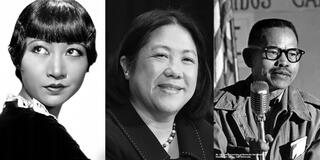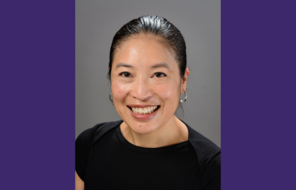
AAPI Trailblazers: Anna May Wong, Larry Itliong, and Mee Moua
My Korean American family immigrated to the US when I was five years old and settled in Wilmington, Delaware, which had few Asian American and Pacific Islander (AAPI) residents. I was aware from this young age that many other children, as well as adults, perceived me and my family as foreign and focused on our "otherness" first and, often, foremost. Classroom lessons about people of Asian heritage were rare and fleeting, while racist, xenophobic taunts and bullying were routine.
Fortunately, important progress is being made in the representation and visibility of AAPI and other marginalized communities in education, leadership, media, and culture. At the same time, AAPI and other communities are confronting intense backlash, marked by ignorance and hostility. The profiles of the three individuals featured here include stories that are unique to them while also highlighting experiences shared by many in our nation's broader history: exclusion, perseverance, and achievement.

Even in contemporary American cinema, opportunities for AAPI actors are fewer than for their white colleagues and roles are still too often defined by tokenism. This article from NPR highlights data around unequal representation—read it while keeping in mind the film and television you consume. Do you observe the lack of diverse characters and voices in what you watch?
Anna May Wong (1905-1961)
Throughout a 40-year stage and film career, Anna May Wong confronted and challenged race and gender discrimination, breaking barriers through talent and determination.
Wong Liu Tsong, also known as Anna May Wong, was born in 1905 near Los Angeles’s Chinatown. She was the second of eight children of parents of Chinese ancestry, each born in California, who owned a laundromat. When Wong was born, the family lived in a diverse community, and the children attended the local public elementary school. Wong and her older sister were teased and bullied due to their race, and their parents enrolled them in a Presbyterian Chinese School, which they found more welcoming.
During Wong’s childhood, movie studios were settling in Los Angeles, and many films were shot in her neighborhood. Captivated by a glamorous industry, Wong peered onto sets to watch actors and filmmakers at work, sparking her decision to become an actor.
Wong began playing background characters and dropped out of high school shortly before landing her first leading role in The Toll of the Sea at age seventeen. To her frustration, she then found few roles for Asian American actors, and most were typically supporting characters based on stereotypes, particularly the shy and exotic “Butterfly” or malevolent and deceitful “Dragon Lady” caricatures. Anti-miscegenation laws at the time also outlawed interracial marriages and even interracial actors kissing on-screen, blocking Wong from leading roles in romantic movies.
After many years trying to work in American films while facing constant discrimination, Wong moved to Europe, which offered more opportunities for nonwhite actors. She became a sensation there, starring in notable roles to wide acclaim and developing close friendships with other female artists including actor Marlene Dietrich and director Leni Riefenstahl.
In 1930, Paramount Studios persuaded Wong to come back to the United States, promising her leading roles. Upon her return, she was still cast to play stereotypical Asian roles including in one of her most famous films, Shanghai Express, co-starring with Dietrich. Over the next three decades, Wong performed in many more films, as well as on stage and television, in the US, and internationally.
Throughout her career, Wong was outspoken about politics and racial discrimination, advocating for Chinese American causes and against racial and cultural stereotyping. Through her creative work, speeches, and interviews, she helped to humanize Asian Americans to mainstream audiences.

This year The New York Times reported how membership in the UFW has dropped from 60,000 to 5,500. And significant decreases in union membership is not unique to farmworkers. Take a look at this article and note the protections that are at risk—protections that Itliong and others fought so hard to make possible.
Larry Itliong (1913-1977)
Larry Itliong played an essential role in the agricultural labor movement in the 1960s, working with Cesar Chavez and Dolores Huerta to launch the United Farm Workers.
In 1929, at the age of fifteen, Modesto “Larry” Dulay Itliong immigrated from the Phillipines to the United States. After landing in Seattle, he performed manual labor on farms in Washington State, a cannery in Alaska, and fields in California.
Along the way, Itliong began organizing fellow single Filipino men, known as manongs, who provided cheap labor. The Immigration Act of 1924 banned Asians from entering the country, but Filipinos were permitted because the US had annexed their country (in 1898). These manongs were largely confined to run-down and segregated labor camps and housing units. Anti-miscegenation laws in multiple states, including California, prohibited Filipinos from marrying whites, and most spent many years cut off from their social and family ties.
Filipinos led farmworker unionization efforts in California in the 1930s and 40s. After returning from Army service during World War II, Itliong became involved in the first major post-war agriculture strike and took on leadership roles in unions and Filipino organizations in Seattle and Stockton, California. By 1965, Itliong was leading the predominantly Filipino AFL–CIO’s Agricultural Workers Organizing Committee. That same year Itliong and over 1,000 Filipino field laborers began strikes against grape growers in California’s Coachella Valley, followed by the town of Delano, to oppose the exploitation of farmworkers and improve wages and working conditions. When these strikes occurred, younger Filipino Americans began a period of increased political self-reflection and awakening.
Mexican and Filipino farmworkers had historically been pitted against each other to suppress wages or break strikes. Despite past tensions, Mexican workers, led by Cesar Chavez, joined Filipinos on the picket lines. These actions would lead Chavez, Dolores Huerta, Itliong, and thousands of Filipino and Mexican farmworkers to create a single powerful agricultural labor union, the United Farm Workers (UFW). Itliong served as a vice president, one of several Filipino leaders on the executive board.
The strike lasted for five years, featuring consumer boycotts, marches, and other grassroots efforts which drew national attention. In 1970, the workers and grape growers reached an agreement that significantly increased pay, health care, and other benefits for over 10,000 farmworkers. The success of the Delano grape strike and the resulting formation of the UFW revolutionized the nation’s farm labor movement.

The fastest growing demographic in America is the AAPI community, and yet as of 2021 Asian American and Pacific Islanders accounted for under 1% of our elected officials. Consider this as you look at who is in your community and how your elected officials represent them.
Mee Moua (1969 - present)
Mee Moua was the first Hmong American elected official in the United States, serving in the Minnesota state senate from 2002-11.
Mee Moua was born in Laos in 1969. During the Vietnam War her family fled to Thailand. In 1978 her family relocated to the United States, along with tens of thousands of other Hmong refugees. Settling in Appleton, Wisconsin, theirs was one of few families of color among mostly white and Catholic neighbors. Although the adjustment was challenging, Moua participated in many school and civic activities, drawing on her Hmong roots for strength and stability.
Moua attended Brown University to study medicine, but after discovering a passion for politics, she switched her focus to public policy and studied poverty and social welfare. After graduating from Brown, she obtained a master's degree in public policy from the University of Texas and a law degree from the University of Minnesota.
During law school, she helped her uncle, Neal Thao, get elected to the St. Paul School Board. She also served as leader of the Hmong Chamber of Commerce and the Hmong Bar Association. When a Minnesota Senate seat became vacant in 2002, Moua entered the race and won the special election, becoming the nation’s first and highest ranking Hmong American elected official. She was re-elected twice and served a total of nine years in the Minnesota Senate. Moua chaired the Minnesota Senate Judiciary Committee and focused on civil rights, education, housing, economic development, and safety.
Through passion and dedication, Moua became a respected leader in the Minnesota Senate and in the national Asian American community. She fought to protect civil rights and to secure funding for crime victims, legal aid, and domestic assault services. In education, she advocated for child care and early childhood funding and against rising tuition at public colleges and universities.
After retiring in 2010, Moua became the president and executive director of Asian Americans Advancing Justice, continuing her work to promote human and civil rights for Asian Americans and social equity for all.
These three profiles represent a small sample of many AAPI figures who have made significant contributions to American society. Unfortunately, most students rarely hear about these histories, leaving them largely unrecognized.



